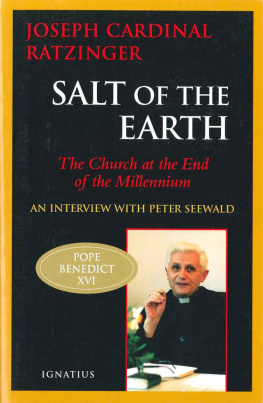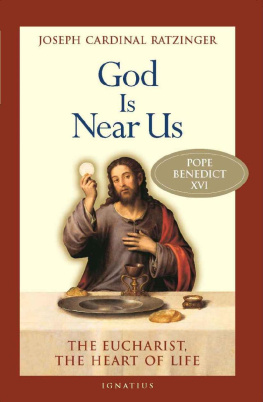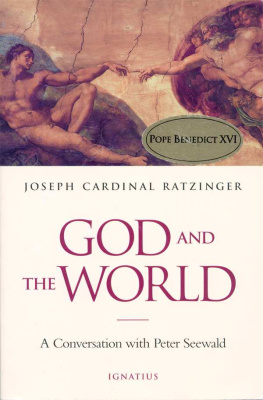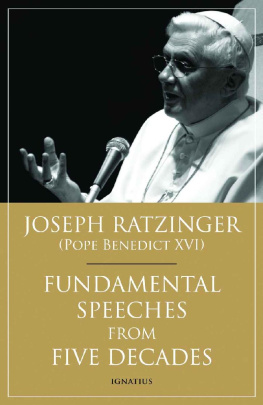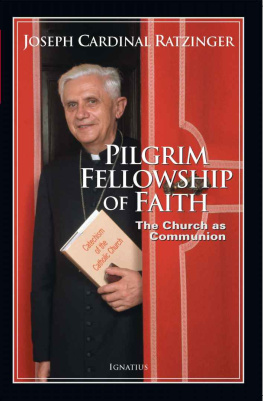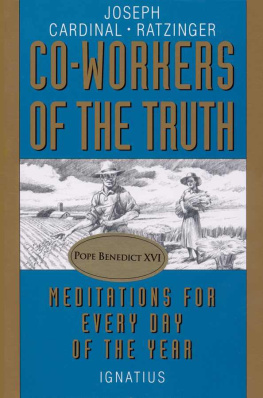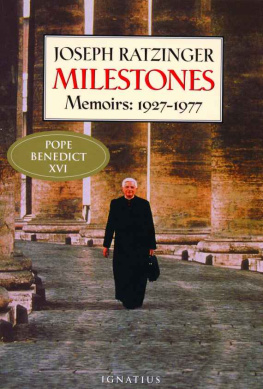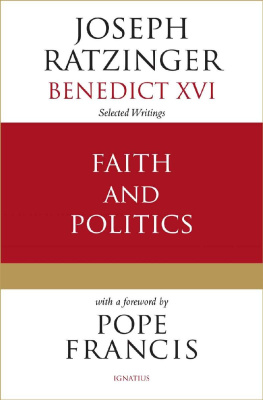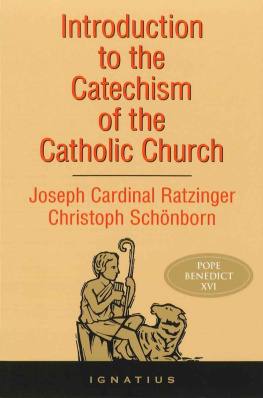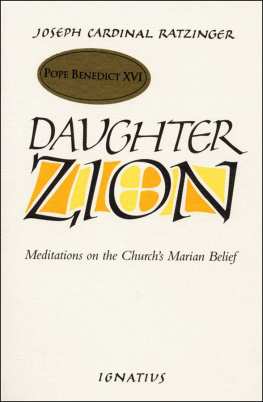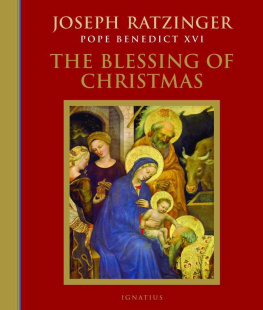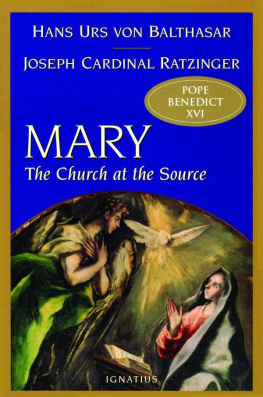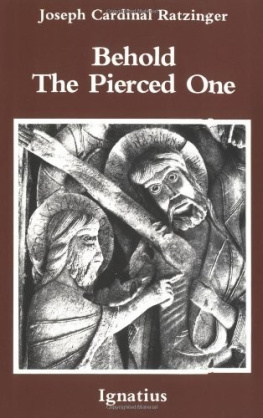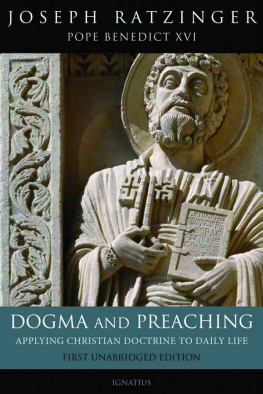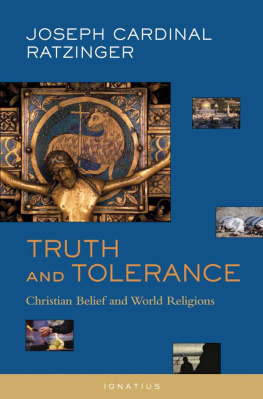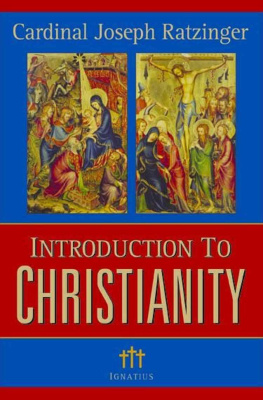Joseph Ratzinger - Salt of the Earth
Here you can read online Joseph Ratzinger - Salt of the Earth full text of the book (entire story) in english for free. Download pdf and epub, get meaning, cover and reviews about this ebook. year: 1997, publisher: Ignatius Press, genre: Religion. Description of the work, (preface) as well as reviews are available. Best literature library LitArk.com created for fans of good reading and offers a wide selection of genres:
Romance novel
Science fiction
Adventure
Detective
Science
History
Home and family
Prose
Art
Politics
Computer
Non-fiction
Religion
Business
Children
Humor
Choose a favorite category and find really read worthwhile books. Enjoy immersion in the world of imagination, feel the emotions of the characters or learn something new for yourself, make an fascinating discovery.
- Book:Salt of the Earth
- Author:
- Publisher:Ignatius Press
- Genre:
- Year:1997
- Rating:4 / 5
- Favourites:Add to favourites
- Your mark:
- 80
- 1
- 2
- 3
- 4
- 5
Salt of the Earth: summary, description and annotation
We offer to read an annotation, description, summary or preface (depends on what the author of the book "Salt of the Earth" wrote himself). If you haven't found the necessary information about the book — write in the comments, we will try to find it.
Salt of the Earth — read online for free the complete book (whole text) full work
Below is the text of the book, divided by pages. System saving the place of the last page read, allows you to conveniently read the book "Salt of the Earth" online for free, without having to search again every time where you left off. Put a bookmark, and you can go to the page where you finished reading at any time.
Font size:
Interval:
Bookmark:
SALT OF THE EARTH
Joseph Cardinal Ratzinger
Christianity and the Catholic Church
at the End of the Millennium
An Interview with Peter Seewald
Translated by Adrian Walker
IGNATIUS PRESS SAN FRANCISCO
Title of the German original:
Salz der Erde: Christentum und katholische Kirche
an der Jahrtausendwende
1996 Deutsche Verlags-Anstalt GmbH, Munich
Verlags gruppe Random House GmbH
Cover photograph by Hermann Dornhege,
I.G. Bildarchiv
Cover design by Roxanne Mei Lum
1997 Ignatius Press, San Francisco
All rights reserved
ISBN 978-0-89870-640-6
Library of Congress catalogue number 97-70806
Printed in the United States of America
Contents
Personal Biography
Problems of the Catholic Church
On the Threshold of a New Era
Foreword
Rome in winter. The people in Saint Peters Square were wearing coats and clasping their umbrellas. In the cafes people were drinking tea, and as I visited a grave in the Campo Santo even the cats were waning [about the cold].
As usual, on Saturday the Cardinal was still at work in his office. We planned to drive afterward to the region of Frascati, to a former Jesuit residence called the Villa Cavalletti. The chauffeur was waiting at the curb in a Mercedes that the Congregation for the Doctrine of the Faith had bought secondhand a few years earlier in Germany. I was standing there with a huge suitcase, as if I were about to take a trip around the world. The door finally opened, and a modest, very white-haired, and slightly fragile-looking man came out with short steps. He wore a black suit with a clerical collar and carried a minuscule, simple suitcase.
I had left the Church a long time before; there were plenty of reasons. Once upon a time, all you had to do was sit in a church, and you got bombarded by particles of faith loaded in the course of centuries. But now every certainty had become questionable, and all tradition seemed impossibly old and stale. Some were of the opinion that religion had to adapt to peoples needs. Others thought that Christianity had outlived its usefulness; it was out of date and no longer had a right to exist. It is not altogether easy to leave the Church. But it is even less easy to return. Does God really exist? And if so, do we need a Church as well? What is it supposed to look likeand how can someone rediscover it?
The Cardinal never asked me about my past or my current status. He didnt want to look at any of the questions beforehand, nor did he request that anything be omitted or added. The atmosphere of our meeting was intense and serious, but sometimes this prince of the Church sat so casually on his chair, one foot on the crossbar, that you might have thought you were talking with a student. Once he interrupted the conversation to retire for a meditation, or maybe to ask the Holy Spirit for the right words. I dont know.
Joseph Cardinal Ratzinger is considered, especially in his homeland, a combative but also controversial churchman. However, many of his early analyses and assessments have proved true, often in detail. And few people are more painfully aware of the losses and the drama of the Church than this shrewd man of simple background from rural Bavaria.
At one point I asked him how many ways to God there were. I really didnt know what he would answer. He could have said, only one or several. The Cardinal didnt take long to answer: As many, he said, as there are people.
PETER SEEWALD
Munich, August 15, 1996
The Catholic Faith: Words and Signs
Your Eminence, it is said that the Pope is afraid of you. He asks himself: For heavens sake, what would Cardinal Ratzinger say about that ?
(Ratzinger, amused): He might say that jokingly, but he is definitely not afraid of me!
Is there a certain ceremonial when you meet with the Pope ?
No.
Do you pray first ?
No, Im afraid I must confess that we dont; we sit down together at the table.
So you come in and shake hands ?
Yes. First I wait; then the Pope comes in. We shake hands, sit down together at the table, and have a little personal chat that doesnt have anything to do with theology per se. Normally I then present what I want to say, the Pope asks whatever questions he has, and this starts another conversation going.
Does he make very concrete remarks ?
It depends on the topic. There are some subjects where he basically waits to see what we have to say. An example is the question about how to admit converted Anglicans into the Catholic Church. Its necessary to find juridical forms for that. In this case, he intervenes very little but says only, Be generous. But the details of the procedure dont interest him so much. Then there are other topics in which he has a very lively interest, such as everything having to do with morality, whether bioethics or social ethics, the whole sphere of philosophy, everything that somehow touches on philosophy. Or the whole sphere of catechesis and doctrine. That interests him very personally, and there are really intense discussions on those points.
What do you wear when you meet ?
The cassock. Its the tradition to meet the Pope in a cassock.
And the Pope ?
He wears a white cassock.
In what language do you converse ?
We speak German.
Not Latin ?
No.
A pious visitor from the Protestant community of the Hutterites once addressed you with the words Brother Joseph. Did you find that inappropriate, if not disrespectful? After all, in customary Catholic usage you are addressed as Your Eminence .
No, I think Brother Joseph is quite all right. Its not our style of speaking, but if we talk about the brotherhood of Christiansin 1960 I wrote a short book about Christian brotherhoodthen its very much in line with something I have tried to keep in mind from very early on in my life.
Does a cardinal have certain higher demands to live up to, higher, I mean, than those placed on, say, a priest or an archbishop ?
A cardinal is a Christian, a priest, and a bishop. He is someone who has a responsibility in the Church to see that the gospel is being proclaimed and the sacraments are being celebrated. I wouldnt simply accept the phrase higher demands. I would say instead that there are very specific demands on a cardinal. Even a parish priest, a simple country priest, has very heavy demands made of him, in that he has to understand people and assist them in sickness, grief, and joy, at marriages and funerals, in crises and in moments of joy. He has to try to believe with them and to keep the ship of the Church on course.
Isnt it extremely wearing having to deal with God every day? Doesnt one get sick and tired of it ?
Dealing with God every day is a necessity for me. For just as we have to breathe every day, just as we need light every day and have to eat every day, just as we also need friendship every day and truly need certain people every day, dealing with God is one of the absolutely fundamental elements of life. If God suddenly disappeared, my soul wouldnt be able to breathe properly. In that sense there is no boredom here. It can occur when it comes to certain pious practices, in relation to certain devotional readings, but not in relation to God as such.
Still, its no doubt also true that one doesnt automatically become more just and gentle or wiser and more faithful by occupying oneself with God and the Church .
Unfortunately, thats true. By itself studying theology doesnt make a person better. It helps to make him better when he doesnt pursue it just as a theory but tries to get a better understanding of himself and of man and the world as a whole in what he reads and then tries to appropriate it as a form of life. But in itself theology is primarily an intellectual occupation above all when it is pursued with scholarly rigor and seriousness. It can have repercussions on ones attitude as a human being, but it doesnt necessarily make man better as such.
Next pageFont size:
Interval:
Bookmark:
Similar books «Salt of the Earth»
Look at similar books to Salt of the Earth. We have selected literature similar in name and meaning in the hope of providing readers with more options to find new, interesting, not yet read works.
Discussion, reviews of the book Salt of the Earth and just readers' own opinions. Leave your comments, write what you think about the work, its meaning or the main characters. Specify what exactly you liked and what you didn't like, and why you think so.

